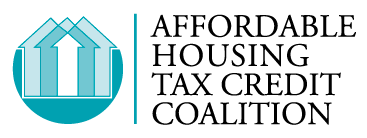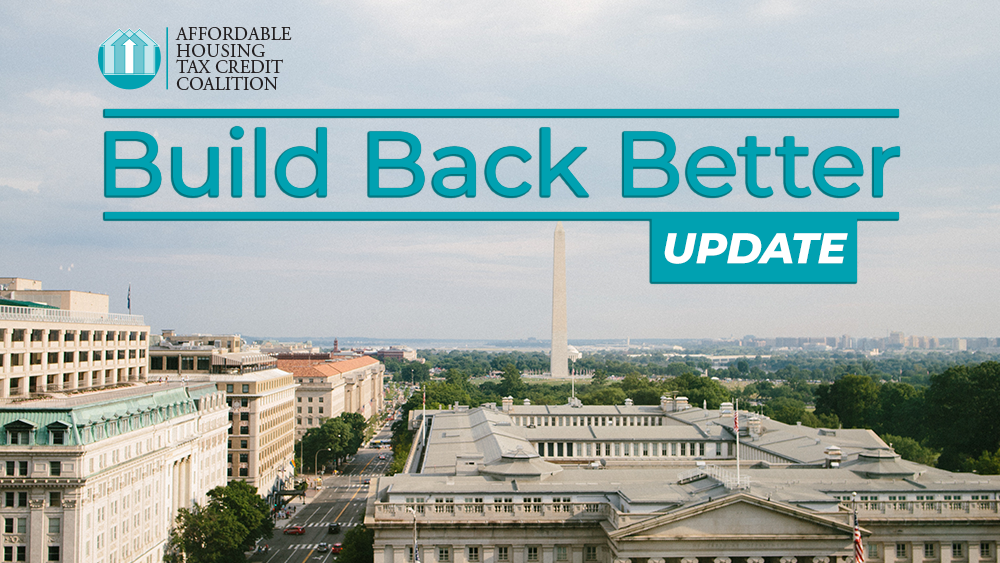This morning the House of Representatives passed the Build Back Better reconciliation bill (see bill text and section-by-section), which could finance nearly 812,000 additional affordable homes than otherwise possible over the next decade by investing nearly $12 billion in the Housing Credit. This investment in the Housing Credit could also spur over 1.2 million jobs, $137 billion in wages and business income, and $47 billion in tax revenue, according to Novogradac and Co., helping to boost local economies while making significant strides toward addressing our nation’s affordable housing crisis.
The bill now moves to the Senate, where it will be considered after the Thanksgiving holiday. As negotiations continue, the final reconciliation bill is expected to include several changes to ensure its final passage. The AHTCC is continuing to engage Congress and the White House to urge that critically needed provisions to increase Housing Credit production are included in the final bill.
As the AHTCC previously reported, the following Housing Credit production proposals are included in the House Build Back Better reconciliation bill:
-
- Lowering the bond-financing threshold from 50 percent to 25 percent for five years, from 2022 to 2026,
- Increasing the annual Housing Credit allocation at a rate of 10 percent per year plus inflation from 2022 to 2024, which amounts to a roughly 41 percent increase over current levels in 2024, followed by inflation adjustments after 2025,
- Providing a permanent 50 percent basis boost for properties serving extremely low-income (ELI) households, along with an 8 percent set-aside for properties taking advantage of the ELI basis boost, as well as a limitation on the amount of allocation and volume cap that can be used for properties receiving the ELI boost, and
- Providing a permanent 30 percent basis boost for properties in Indian areas.
See below for additional details about the Housing Credit provisions.
We encourage affordable housing stakeholders to thank any Democratic House members with whom you have been engaging regarding the Housing Credit and Build Back Better. We also encourage stakeholders to continue to urge Democratic Senators to ensure key Housing Credit production provisions are included in the final reconciliation bill. AHTCC members will receive more information about opportunities to advocate for these proposals in the coming weeks. Learn more about AHTCC membership here.
Housing Credit Details in Build Back Better
Housing Credit Provisions that Originated in the Affordable Housing Credit Improvement Act
-
- Lowering the 50 percent bond financing threshold test to 25 percent for 5 years (2022 to 2026), for “any building some portion of which, or of the land on which the building is located, is financed by an obligation which is described in section 42(h)(4)(A) and which is part of an issue the issue date of which is after December 31, 2021.”
-
- Cost and Impact Estimates: From 2022 to 2031, this provision would provide an investment of $8.6 billion, according to the Joint Committee on Taxation (JCT), and could finance 712,400 additional affordable homes than otherwise possible, according to Novogradac and Co.
-
- Lowering the 50 percent bond financing threshold test to 25 percent for 5 years (2022 to 2026), for “any building some portion of which, or of the land on which the building is located, is financed by an obligation which is described in section 42(h)(4)(A) and which is part of an issue the issue date of which is after December 31, 2021.”
-
- Increasing the annual Housing Credit allocation at a rate of 10 percent per year plus inflation from 2022 to 2024, which amounts to a roughly 41 percent increase over current levels in 2024 (inclusive of a continuation of the current 12.5 percent cap increase), followed by inflation adjustments after 2025. Note that we are in continued discussions around the allocation level for 2025, and changes may be possible within scoring constraints.
-
-
-
- Per Capita and Small State Minimum Allocation Amounts for 2022 to 2025:
- 2022: $3.14 per capita; $3,629,096 small state minimum
- 2023: $3.54 per capita; $4,081,825 small state minimum
- 2024: $3.97 per capita; $4,582,053 small state minimum
- 2025: $2.65 per capita; $3,120,000 small state minimum
- Note that the current allocation for 2021 is 2.81 per capita; $3,245,625 small state minimum.
- Cost and Impact Estimates: From 2022 to 2031, this provision would provide an investment of $2.1 billion and would finance 43,900 additional affordable homes than otherwise possible.
- Per Capita and Small State Minimum Allocation Amounts for 2022 to 2025:
-
-
-
- Providing a permanent 50 percent basis boost for developments serving Extremely Low-Income (ELI) households, as well as requiring an 8 percent set-aside for ELI properties, effective for buildings placed in service after December 31, 2021
-
-
-
- ELI Building Definition: Buildings serving ELI households are defined as buildings in which at least 20 percent of units are restricted for households whose aggregate household income does not exceed the greater of 30 percent of area median gross income or 100 percent of the federal poverty line.
- Set-Aside: Allocating agencies must allocate a minimum of 8 percent of the annual 9 percent Housing Credit allocation for developments serving ELI households. Note that the set-aside and following limitation did not originate in the AHCIA.
- Limitation on Basis Boost: The 50 percent ELI basis boost is available for both the 9 percent and 4 percent Housing Credit, and is available for up to 13 percent of the state’s annual Housing Credit allocation and 8 percent of the state’s annual Private Activity Bond volume cap.
- Cost and Impact Estimates: From 2022 to 2031, this provision would provide an investment of $2.0 billion and would finance 53,600 additional affordable homes than otherwise possible.
-
-
-
- Providing a permanent 30 percent basis boost for developments in Indian areas, effective for buildings placed in service after December 31, 2021, by designating Indian areas as Difficult to Develop Areas.
-
-
-
- Indian Area Definition: Indian Areas are defined in the Native American Housing Assistance and Self Determination Act of 1996. To qualify, buildings must be assisted or financed under the same Act, the project sponsor must be a qualifying Indian tribe or a tribally designated housing entity, or the building must be wholly owned or controlled by a qualifying Indian tribe or tribally designated housing entity.
- Cost and Impact Estimates: From 2022 to 2031, this provision would provide an investment of $117 million and would finance 2,000 additional affordable homes than otherwise possible.
-
-
Additional Housing Credit Provisions
-
- Allowing for the Sec. 48 energy Investment Tax Credit to be taken on a Housing Credit property without reducing the eligible basis for the Housing Credit.
- Curtailing the use of Qualified Contracts by repealing the option for buildings receiving allocations after January 1, 2022, and, for existing properties, changing the price for the low-income portion of a property to fair market value, determined by the allocating agency taking into account the rent restrictions required to continue to satisfy the minimum set aside requirements. According to JCT, this provision would raise $457 million in revenue from 2022 to 2031.
- Making several modifications to the Right of First Refusal (ROFR) by (i) converting the right to a purchase option for agreements entered into after passage, (ii) allowing the inclusion of partnership assets related to the building in the definition of property; (iii) allowing the option holder to exercise the right of first refusal without requiring the approval of an investor or requiring a bona fide third party offer; and (iv) changing the purchase price to only debt and not debt plus exit taxes. The changes are not intended to change any express provision in an existing agreement. According to JCT, this provision would raise $553 million in revenue from 2022 to 2031.



Comments are closed.